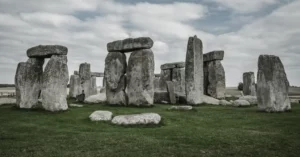AI Answer Evaluation Platform Live Now. Try Free Answer Evaluation Now
Cognitive Archaeology
Cognitive archaeology is a study of archaeology that aims to understand the mental processes and cognitive abilities of ancient cultures by the analysis of material culture, such as artifacts, architecture, and art. It is founded on the assumption that the physical relics left by former cultures carry information about their manner of thinking, problem-solving, and decision-making.

Cognitive archaeologists utilize a number of multidisciplinary techniques, including psychology, neurology, linguistics, and anthropology, to study how earlier cultures processed and interpreted information and how they comprehended the world around them. They may also utilize experimental archaeology to replicate and test ancient methods and technology to acquire insights into the cognitive processes involved in their creation and usage.
Some of the primary themes of inquiry in cognitive archaeology include the development of language and symbols, the evolution of social complexity and decision-making, the use of tools and technology, and the ways in which previous cultures understood and interacted with their natural environment.
Cognitive archaeology has tremendous implications for understanding human evolution and the development of human cognition, as well as for the interpretation of archaeological artifacts and the reconstruction of past civilizations.
Primary Approaches Applied in Cognitive Archaeology
Contextual analysis: Cognitive archaeologists analyze artifacts, architecture, and art within their larger archaeological, cultural, and historical contexts to understand how they were used, what they symbolized, and how they were made.
Experimental archaeology: Cognitive archaeologists may utilize experimental archaeology to reproduce and analyze ancient procedures and technologies, to get insights into the cognitive processes involved in their creation and usage.
Ethnoarchaeology: Ethnoarchaeology entails researching the material culture of modern civilizations to get insights into the cognitive processes involved in its production and usage. This may give essential reference data for understanding the material culture of earlier nations.
Iconography: Iconography is the study of symbols, pictures, and other visual representations to obtain insights on the technique by which ancient cultures perceived the world around them.
Linguistic analysis: linguistic analysis entails analyzing language and language usage in ancient cultures to get insights into their cognitive processes and social systems.
Cognitive psychology: Cognitive archaeologists may utilize ideas from cognitive psychology to explain how ancient cultures processed and interpreted information and how they experienced the world around them.
These approaches are often applied in tandem with one other to offer a more thorough understanding of the mental processes and cognitive capabilities of ancient cultures.
Cognitive archaeology research Avenues
Cognitive archaeology is an interdisciplinary topic that explores the cognitive capacity and mental processes of ancient cultures through the study of material culture. Some of the primary study topics in cognitive archaeology include:
Evolution of language and symbolism: Cognitive archaeologists examine the history of language and symbolic communication, including the beginnings of writing, creative expression, and the use of symbols and iconography in various cultures.
Evolution of social complexity and decision-making: Cognitive archaeologists investigate the evolution of social organization, decision-making, and governance, including the role of leadership, consensus building, and collaboration in the creation of complex societies.
Use of tools and technology: Cognitive archaeologists examine the use of tools and technology in many cultures, including the development of specialized skills, the growth of technical innovation, and the influence of technology on social and economic systems.
Perception of the natural environment: Cognitive archaeologists explore how ancient cultures saw and interacted with their natural environment, including their idea of the cosmos, their interaction with animals, and their exploitation of natural resources.
Ritual and religion: Cognitive archaeologists investigate the function of ritual and religion in many cultures, especially the use of holy locations, sacred objects, and ritual activities to transmit beliefs and build social cohesiveness.
Art and aesthetics: Cognitive archaeologists investigate the importance of art and aesthetics in many civilizations, especially the function of art in communication, expression, and social identity.
Generally, cognitive archaeology tries to shed light on the manner in which ancient cultures viewed, processed, and manipulated information and to give insights into the development of human cognition and social interaction.




